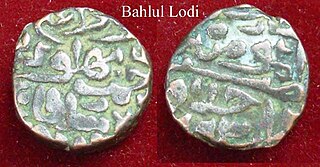Related Research Articles

The Chishtī Order is a tariqa, an order or school within the mystic Sufi tradition of Sunni Islam. The Chishti Order is known for its emphasis on love, tolerance, and openness. It began in Chisht, a small town near Herat, Afghanistan, about 930 AD.

Muhammad Nizamuddin Auliya, also known as Hazrat Nizamuddin, and Mahbub-e-Ilahi was an Indian Sunni Muslim scholar, Sufi saint of the Chishti Order, and is one of the most famous Sufis from the Indian Subcontinent. His predecessors were Fariduddin Ganjshakar, Qutbuddin Bakhtiyar Kaki, and Moinuddin Chishti, who were the masters of the Chishti spiritual chain or silsila in the Indian subcontinent.

Bahlul Lodi was the chief of the Pashtun Lodi tribe. Founder of the Lodi dynasty from the Delhi Sultanate upon the abdication of the last claimant from the previous Sayyid rule. Bahlul became sultan of the dynasty on 19 April 1451.

The Lodi dynasty was an Afghan dynasty that ruled the Delhi Sultanate from 1451 to 1526. It was the fifth and final dynasty of the Delhi Sultanate, and was founded by Bahlul Khan Lodi when he replaced the Sayyid dynasty.

Makhdoom Yahiya Maneri was an Indian Sufi saint of the 13th century. His tomb in courtyard of a mosque, located in Maner, 29 km from Patna, Bihar, India.

The Qadiriyya are members of the Sunni Qadiri tariqa. The tariqa got its name from Abdul Qadir Gilani, who was a Hanbali scholar from Gilan, Iran. The order relies strongly upon adherence to the fundamentals of Sunni Islam.

The Suhrawardiyya is a Sufi order founded by the Sufi Diya al-din Abu 'n-Najib as-Suhrawardi. It is a strictly Sunni order, and, like many such orders, traces its spiritual genealogy (silsila) to Ali ibn Abi Talib through Junayd Baghdadi and al-Ghazali. It played an important role in the formation of a conservative ‘new piety’ and in the regulation of urban vocational and other groups, such as trades-guilds and youth clubs, particularly in Baghdad.

Shaykh al-Mashāʾikh Makhdūm Shaykh Jalāl Mujarrad bin Muḥammad Kunyāī, popularly known as Shah Jalal, is a celebrated Sunni Muslim and Sufi Saint in Bengal. Shah Jalal's name is often associated with the Conquest of Sylhet and the spread of Islam into the region, part of a long history of interactions between the Middle East, Turkestan, and South Asia. Various complexes and religious places have been named after him, including the largest airport in Bangladesh, Hazrat Shahjalal International Airport.
The Hazrat Pir Muhammad Shah Library is a library on Pir Muhammad Shah Road, Pankore Naka, Ahmedabad, in the state of Gujarat, India. One of the oldest libraries in India, it has a collection of rare original manuscripts in Arabic, Persian, Urdu, Sindhi and Turkish languages.

Baha-ud-din Zakariya, also spelled Bahauddin Zakariya, and also known as Baha-ul-Haq and Bahauddin Zakariya Multani, was a Sunni Muslim scholar saint and poet who established the Suhrawardiyya order of Baghdad in medieval South Asia, later becoming one of the most influential spiritual leaders of his era.

Nasiruddin Mahmud Chirag-Dehlavi was a 14th-century mystic-poet and a Sufi saint of the Chishti Order. He was a disciple of Sufi saint Nizamuddin Auliya, and later his successor. He was the last important Sufi of the Chishti Order from Delhi.

Jalaluddin "Surkh-Posh" Bukhari was a Sufi saint and missionary belonging to the Sufi order of Hussaini Jalali. He venerated in his own tareeqa e hussaini. A lot of people attribute him to suharwardiya which is completely against the facts. He was a contemporary of baha ul din zikriya r.a but not a disciple. The original mushajrat and complete history of his work and personal life is under possession of Bukhari sadaat of uch-Bukhari. A lot of books are written on his life which contains mainly non-reliable sources creating misinformation about the saint.
Shaikh Inayat-Allah Kamboh (1608–1671) was a scholar, writer and historian. He was son of Mir Abdu-lla, Mushkin Kalam, whose title shows him to also have been a fine writer. Shaikh Inayat-Allah Kamboh was elder brother and teacher of Muhammad Saleh Kamboh, the famous historian of Shah Jahan's court and teacher of Mughal Emperor Aurangzeb. He died in 1671 AD at Delhi, and his Maqbara is located in Guband Kambohan wala on Empress Road near Railways Headquarters, Lahore.
Shaikh Gadai Kamboh was the son, disciple and successor of famous scholar, philosopher and poet-laureate Shaikh Jamali Kamboh of Delhi and brother of the 'Master of Expression' —Shaikh Abd-al-Hai Hayati. His real name was Abdur Rehman but he became famous as Gadai. He was well-renowned for his sanctity and learning and was in high favour with emperor Humayun and Bairam Khan. He is also said to have remained a Musahib of the Afghan emperor Salim Shah Suri. During Akbar’s reign, he occupied the high office of “Sadr-i-sadur” of Hindustan.
Shaikh Jamali Kamboh was a 16th-century poet and Sufi of the Suhrawardiyya sect and pupil of Poet Jami and of Shaikh Sama'al-Din Kamboh'

Hazrat Nassar-Ud-Din popularly known as Baba Naseeb-ud-Din Ghazi as per an article issued by Jammu and Kashmir Cultural Academy, was basically from Rawalpendi and has come with his father.Mr.Hassan Eazi to Kashmir.At the age of 7 years only, he went to Sultan ul Arifeen Sheikh Hamza Makhdoom for attaining spiritual teachings, later Hazrat Makhdoom handed over Baba Naseeb Hazrat to Sheikh Dawood Khaki. Baba Naseeb was an able Persian and Kashmiri writer. During preaching of Islam Baba Naseeb Ud Din Ghazi visited most in-accessible areas that time which include, Tibet, Iskardu, Karnah, Dardistan, Baltistan, Kishtwar, Doda, Baderwah, Poonch, Rajouri, Nowshera, Budgam etc. He constructed 1200 Mosques and Bathrooms, Musafir Khanas, Bridges and planted trees on both sides of the roads wherever he went to apprise people about the teaching Islam.

ʿAlā ul-Ḥaq, also known as Ahmad and by his sobriquet Ganj-e-Nabat, was a 14th-century Islamic scholar of Bengal. Posted in Hazrat Pandua, he was the senior disciple and successor of Akhi Siraj, and a Bengal Sultanate government official.

Usman Serajuddin, known affectionately by followers as Akhi Siraj, was a 14th-century Bengali Muslim scholar. He was a Sufi belonging to the Chishti Order and was a disciple of Nizamuddin Auliya of Delhi. As one of the senior disciples of Nizāmuddīn Auliyā, he spent long years with him in Delhi and earned the sobriquet of Āinā-e-Hind. His shrine, the Pirana Pir Dargah in Gaur, West Bengal, attracts hundreds of thousands of devotees every year. Siraj and his successor, Alaul Haq, are credited with the rise to prominence of the Chishti order in Bengal.

ʿAbd al-Razzāq b. ʿAbd al-Qādir al-Jīlānī, also known as Abū Bakr al-Jīlī or ʿAbd al-Razzāq al-Jīlānī for short, or reverentially as Shaykh ʿAbd al-Razzāq al-Jīlānī by Sunni Muslims, was a Persian Sunni Muslim Hanbali theologian, jurist, traditionist, and Sufi mystic based in Baghdad. He received his initial training in the traditional Islamic sciences from his father, Abdul-Qadir Gilani, the founder of the Qadiriyya order of Sunni mysticism, prior to setting out "on his own to attend the lectures of other prominent Hanbali scholars" in his region. He is sometimes given the Arabic honorary epithet Tāj al-Dīn in Sunni tradition, due to his reputation as a mystic of the Hanbali school.
References
| Part of a series on Islam Sufism |
|---|
 |
| |